Agentic AI in Healthcare: Preventing Misdiagnosis and Reducing Diagnostic Delays
However, agentic AI goes beyond this. Instead of waiting for commands, agentic AI systems take initiative and act independently, making decisions and representing care teams based on real-time data and contextual knowledge. With digital health software development services, healthcare organizations can enhance patient care delivery, expedite decision-making, and optimize workflows with agentic automation.
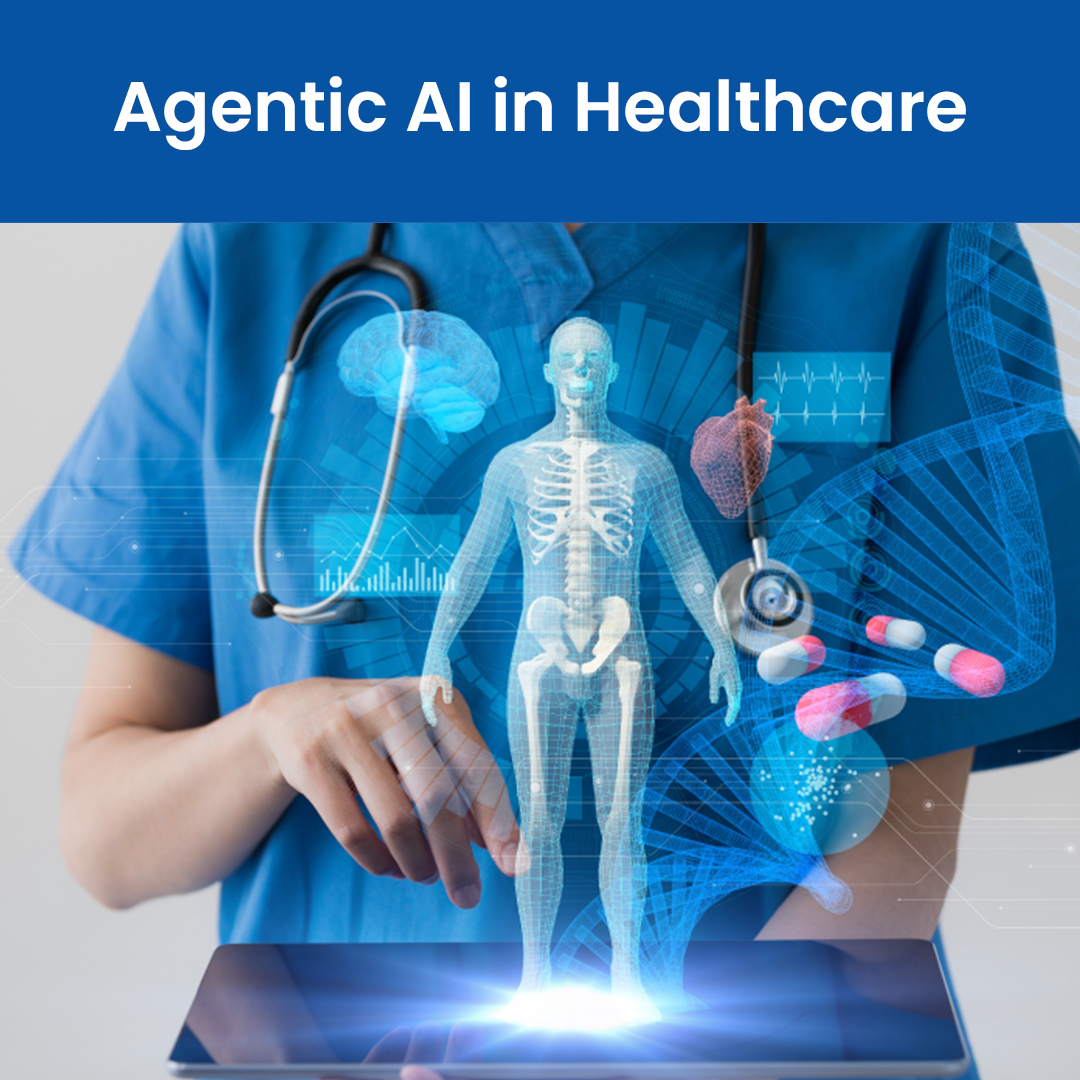
Prevent Misdiagnosis with Agentic AI – Empower Clinicians to Detect Hidden Patterns and Improve Diagnostic Accuracy

“One common fear is that agents can make healthcare decisions without any human oversight, which would lead to substantial risk. To be clear: Agentic AI allows a spectrum of autonomy. In high-stakes contexts such as healthcare, a strategically placed human in the loop can be a critical safeguard. The good news is that with appropriate governance and oversight, agents can be used across the full gamut of front-office to back-office activities.”– McKinsey
How Does Agentic AI in Healthcare Work?
Applications for healthcare AI agents are numerous in the medical sector, including:
- By screening billions of molecules and determining which combinations will work best, scientists can create new treatments more quickly.
- Examining insurance denials, offering instances of comparable circumstances, and creating appeals that can be automatically forwarded to payers.
- Serving as a virtual health assistant providing appointment and medication reminders and real-time monitoring.
- Evaluating patient records and suggesting treatments to assist with clinical referrals and diagnosis.
- Identifying eligible individuals and keeping an eye on participants for any positive or negative impacts to assist researchers in conducting clinical trials.
An American Hospital Association report states that administrative costs account for 40% of all hospital expenses. According to industry analysts, healthcare businesses are expected to increase their AI agent usage soon to enhance their back-office operations.
Hospitals must decide on staffing, pay, bed occupancy rates, inventory control, and quality standards. AI systems can swiftly examine all the information and offer suggestions for improving the hospital’s efficiency.
Why Forward-Thinking Healthcare Leaders Are Turning to Agentic AI
Urgency is the foundation of the argument for agentic AI. Information overload, staffing shortages, and cost demands are putting a strain on health institutions.
40% of physician burnout is caused by EHR-related responsibilities alone, and physicians spend up to two hours on administrative work for every hour spent caring for patients. These pressures can be lessened with agentic AI in healthcare, which restores time and focus to patients and results.
Role of AI in healthcare assists in directly addressing these issues:
- Administrative Relief: Agents handle scheduling, claims validation, and form generation, allowing human teams to concentrate on more complex tasks.
- Risk Detection: Agents identify early warning indicators, assess risk factors for patients, and recommend prompt actions.
- Data Prioritization: Agents highlight important findings using inputs from wearables, unstructured notes, and EHRs.
Data Overload and Other Top 3 Challenges in Healthcare
According to a report by 2025, the world’s data generation would reach 180 zettabytes, with over one-third coming from healthcare data.
Due in large part to ineffective systems that are unable to analyze multi-modal data at scale, only 3% of healthcare data is currently used efficiently. As a result, physicians must manually go through data to extract insights for patient care. According to the NIH, medical knowledge doubles every 73 days, especially in neurology, cardiology, and oncology.
An oncologist analyzing PSA findings, for instance, must consider all medications, therapies, procedures, symptoms, medical imaging, biopsies, and co–morbidities within a 15–30–minute consultation. is dispersed over multiple documents and systems.
There are logistical issues for caregivers as well. 25% of cancer patients miss care, which makes scheduling difficult and creates backlogs that make it almost impossible to give high-risk patients priority.
The consequences of data overload in healthcare include issues such as:
- Cognitive Overload: Under strict time restrictions, clinicians must extract usable insights from enormous volumes of data.
- Care Plan Orchestration: Coordinating complex care plans across several specialty departments, such as radiology, surgery, oncology, etc., presents considerable challenges.
- Fragmented Systems & Processes: Healthcare systems lack departmental communication and function in silos. Manual procedures for making test requests, making appointments, and exchanging patient data between departments cause delays in medical care.
From Promise to Impact: The Potential of Agentic AI in Healthcare
1. Personalized Patient Engagement
Medical personnel have little time to devote to developing meaningful connections with patients since they are always multitasking. It can be lessened with the use of agentic AI. According to studies, doctors saw an average of 11.3 more people each week and spent 24% less time on documentation.
In addition to efficiency, agentic AI reduces no-show rates, boosts revenue, and promotes improved health outcomes, all of which contribute to lower costs and higher-quality treatment.
2. Streamlined Operational Excellence
Clinics and hospitals often face fragmented data scattered across multiple systems, hindering accuracy and efficiency. By automatically combining patient information, test results, medications, imaging, and other important data into a single perspective, agentic AI removes this difficulty.
By managing these intricate, data-intensive processes, it optimizes staff effort, minimizes administrative burdens, and lowers costs, all of which are important components that increase employee retention. This enables healthcare teams to refocus their time and efforts on providing more accurate and efficient, higher-quality patient care.
3. Faster Medical Research & Drug Development
According to a 2024 McKinsey report, healthcare data made up 30% of all data worldwide, and by 2025, it was expected to expand at a 36% CAGR, underscoring the complexity of the field. By expediting medical research, simplifying medication development, and quickly analyzing massive datasets, agentic AI aids in overcoming these challenges.
In addition to speed, it improves clinical decision support by giving clinicians direct access to evidence-based treatment regimens, which eventually improves patient outcomes and reduces development costs.
4. Advancing Patient Wellbeing
Agentic AI and healthcare offer far more than speed. By continuously learning from large datasets, it quickly identifies early warning indicators in patient vitals and suggests remedies. In addition to improving patient outcomes, its real-time adaptation lowers the possibility of serious complications in emergencies. Additionally, proper risk adjustment is supported by agentic AI, which helps healthcare professionals better gauge health outcomes and cost savings.
It ensures appropriate payment for providing care to patients with chronic illnesses by coordinating payments with risk adjustment factors, resulting in a more equitable and sustainable care model.
Bridge Data Gaps with Agentic AI & Provider Operations Software Development Services by Integrating Clinical Records, Images, And Labs into Unified Insights
The Ultimate Use Cases of Agentic AI Healthcare – Driving Patient Engagement and Experience
The healthcare industry is already being significantly impacted by agentic AI. In fact, it is anticipated that the “smart hospital” market, which is being driven by robotics, IoT, and AI, would reach $148 billion by 2029, changing both patient care and operational efficiency.
These are eight ultimate Agentic AI in healthcare use cases that are enhancing patient care and expediting healthcare procedures.
 1. Clinician Burnout Mitigation
1. Clinician Burnout Mitigation
Burnout is a significant issue for patient safety as well as a worker problem. Furthermore, the complexity of care is not what depletes most physicians. They are drawn away from the primary reasons for entering the medical field by the debilitating burden of low-value duties.
In 2024, U.S. doctors reported working on administrative tasks for around 28 hours a week, which included over 10 hours on communication workflows and 8.8 hours on paperwork. That is more than half of the workweek spent on administrative duties rather than providing clinical care.
This is where agentic AI starts to change the game, not by taking the place of clinicians, but by giving them relevant work again.
An AMA study highlights this change:
- AI is now used in daily practice by 66% of doctors, up from 38% in 2023.
- Administrative automation was cited by 57% as the greatest benefit of AI.
- 54% adopted Agentic AI primarily to reduce clinician burnout.
Agentic AI is not limited to reducing burnout. It assists medical professionals in rediscovering the purpose of healthcare. And in doing so, it safeguards patient safety and the welfare of providers on a large scale.
Check our Success Story: From Months to Minutes: AI-Driven Ingredient Intelligence Revolutionizing OTC Drug Discovery
2. Intelligent Patch Management & Predictive Maintenance for Medical Equipment
Keeping systems updated and safe is critical in the healthcare industry. Prioritizing patch management and security is more crucial than ever since healthcare businesses handle enormous amounts of sensitive data. Routine patch management and patch deployment can be done without human intervention with agentic AI systems. These responsibilities can be handled by agentic AI solutions, giving your IT staff more time and maintaining a more secure network and IT environment than before.
Agentic AI can perform asset management tasks that surpass the outdated, manual techniques still used by many healthcare institutions. Before they become serious problems, these AI agents can find and fix flaws in critical healthcare technologies. Additionally, AI inventory management technologies can assist in budget allocation decisions that will help hospital boards better plan and monitor equipment utilization to identify when items need to be replaced.
3. Personalized Treatment & Precision Medicine
One of the most important uses of agentic AI in healthcare is the creation of more individualized therapy and pharmaceutical regimens through AI-driven insights. With the use of these insights, healthcare professionals can customize treatment plans for each patient based on clinical and genetic data, as well as health history and lifestyle information.
The outcomes? Better patient outcomes and more effective therapies are the results of more personalization and customization in the medical industry. Additionally, the use of AI agents improves patient compliance, dosage accuracy, side effect management, and therapy success.
4. Securing Patient Data & Reducing Physician and Staff Workloads
AI is essential for enhancing patient data security because it automates and tracks adherence to regulations like GDPR and HIPAA.
Proper encryption, access management, and real-time data usage tracking are all ensured by these AI-powered platforms.
- Detects Unusual Access Patterns Instantly
- Validates Compliance Seamlessly
- Predicts Security Threats Proactively
Healthcare providers lower the risk of breaches and improve patient confidentiality by incorporating AI.
5. Remote Patient Monitoring & Predictive Analytics
Wearables and remote monitoring devices with AI are revolutionizing patient care by continuously monitoring vital signs. To detect any early warning indications of health problems, AI algorithms examine the health data that these devices continuously gather, including heart rate, blood pressure, and oxygen levels.
These technologies enable proactive care, managing chronic illnesses and preventing hospitalization through timely emergency alerts.
With AI powered remote patient monitoring software development services, devices that track the blood sugar levels of diabetic patients or the heart rhythms of cardiac patients can send out alarms in the event of any significant abnormalities, requiring rapid medical attention.
6. Intelligent Drug Discovery & Development
A traditionally costly and time-consuming procedure is being transformed by intelligent drug discovery and development agents. These agentic AI systems search through enormous biological and chemical datasets on their own to find possible therapeutic targets and create new medication molecules. In addition to predicting therapeutic efficacy and toxicity, they can independently study chemical structures, execute millions of virtual tests, and refine candidate designs.
Compared to human-led endeavors, these agents’ capacity to self-direct research enables them to conduct significantly more extensive chemical space exploration. Early-stage discovery, the riskiest step of pharmaceutical development, will be accelerated and de-risked by utilizing agentic AI. The objective is to decrease the time and expense spent on unpromising leads while simultaneously increasing the number of promising drug candidates entering the pipeline.
7. AI-Powered Robotic Surgery Assistants
AI-driven robotic surgery assistants are rapidly evolving from human-guided instruments to partially autonomous agents, redefining surgical innovation. These systems integrate advanced robotics, high-fidelity computer vision, and machine learning to assist or independently perform surgical procedures with exceptional precision. By adapting in real time to each patient’s unique anatomy, they enhance accuracy and consistency beyond human capability. Their ability to interpret the surgical field and act toward predefined goals, such as maintaining safe margins, reflects their agentic intelligence.
Agentic surgical robots aim to reduce variability in surgical outcomes, minimize human error and fatigue, and standardize excellence, ensuring that every procedure, whether routine or complex, is performed with the highest level of safety and efficiency.
8. Equipment Location to Address Access & Allocation Purposes
Agentic AI can transform how healthcare organizations manage and utilize critical equipment. By adding real-time equipment location tracking, hospitals, and clinics can address access and allocation challenges with precision. An AI-enabled asset management solution ensures that equipment and supplies are always available where they are needed most, reducing delays in care delivery. This not only maximizes equipment usage but also minimizes wastage and idle time.
Automated allocation further improves patient experience by ensuring timely access to diagnostic and treatment tools, enhancing operational efficiency while driving better outcomes for both patients and providers.
Transform Clinical Documentation with Agentic AI To Align Records And ICD-10 Coding for Greater Efficiency
Future Trends in Agentic AI and Healthcare
Healthcare is becoming more efficient, personalized, and predictive due to rapid technological breakthroughs. These developments will revolutionize operating procedures, medical research, and patient care.
- Smarter Drug Discovery: Predicting interactions and identifying possible therapeutic molecules will be accelerated by new technologies. As a result, patients will receive life-saving treatments sooner and at a lower cost.
- Precision in Surgery: Recovery times will be shortened and surgery accuracy improved with robotic assistance. Better results and fewer issues will result from less invasive procedures.
- Real-Time Disease Monitoring: Predicting health trends and monitoring disease outbreaks will be made possible by advanced data analysis. Proactive measures will enhance pandemic preparedness and public health tactics.
These healthcare trends will boost productivity, enhance patient satisfaction, and build a more proactive healthcare system.
Ethical Considerations for Deploying Agentic AI Solutions
- Patient Privacy & Data Security: For any healthcare provider or institution, protecting sensitive patient data is essential. Given that agentic AI systems are autonomous and frequently handle enormous volumes of private health data, it seems sensible that stringent restrictions are necessary. One such measure may be the use of end-to-end encryption for all patient data transfers and storage.
- Fairness & Bias Mitigation (ISO 42001): AI systems have the potential to unintentionally lead to healthcare inequalities that impact marginalized communities. Implementing regular evaluations using automated methods to check AI models for biases will guarantee fairness and equity.
- Compliance with Regulatory Standards: Ensuring ethical and legal accountability requires strict adherence to evolving AI regulations in healthcare. Organizations must provide ongoing compliance training, equipping employees to navigate both regulatory requirements and the ethical considerations of AI implementation in clinical settings.
How NextGen Invent Can Support Your Agentic AI Journey
It takes more than just technical know-how to develop and implement agentic AI systems; it also calls for in-depth healthcare knowledge, regulatory compliance, and smooth workflow integration. Clinical decision-making, intelligent automation, and patient interaction are all supported by NextGen Invent’s demonstrated expertise in digital health software development services.
Accelerate Agentic AI Adoption with NextGen Invent
- Custom AI Development: Develop and implement AI solutions that enhance administrative processes, automate healthcare delivery, and enhance diagnostics.
- Healthcare-Specific Intelligence: Address real-world healthcare issues with AI, such as virtual triage, chronic disease management, and operational optimization.
- Seamless System Integration: Integrate AI agents with current backend systems, patient interaction tools, and EHR platforms to ensure long-term maintainability, scalability, and compliance.
Are you considering integrating agentic AI into your healthcare solutions? To include more innovative, flexible technology in patient care, collaborate with NextGen Invent.
Frequently Asked Questions About Agentic AI in Healthcare
Related Blogs
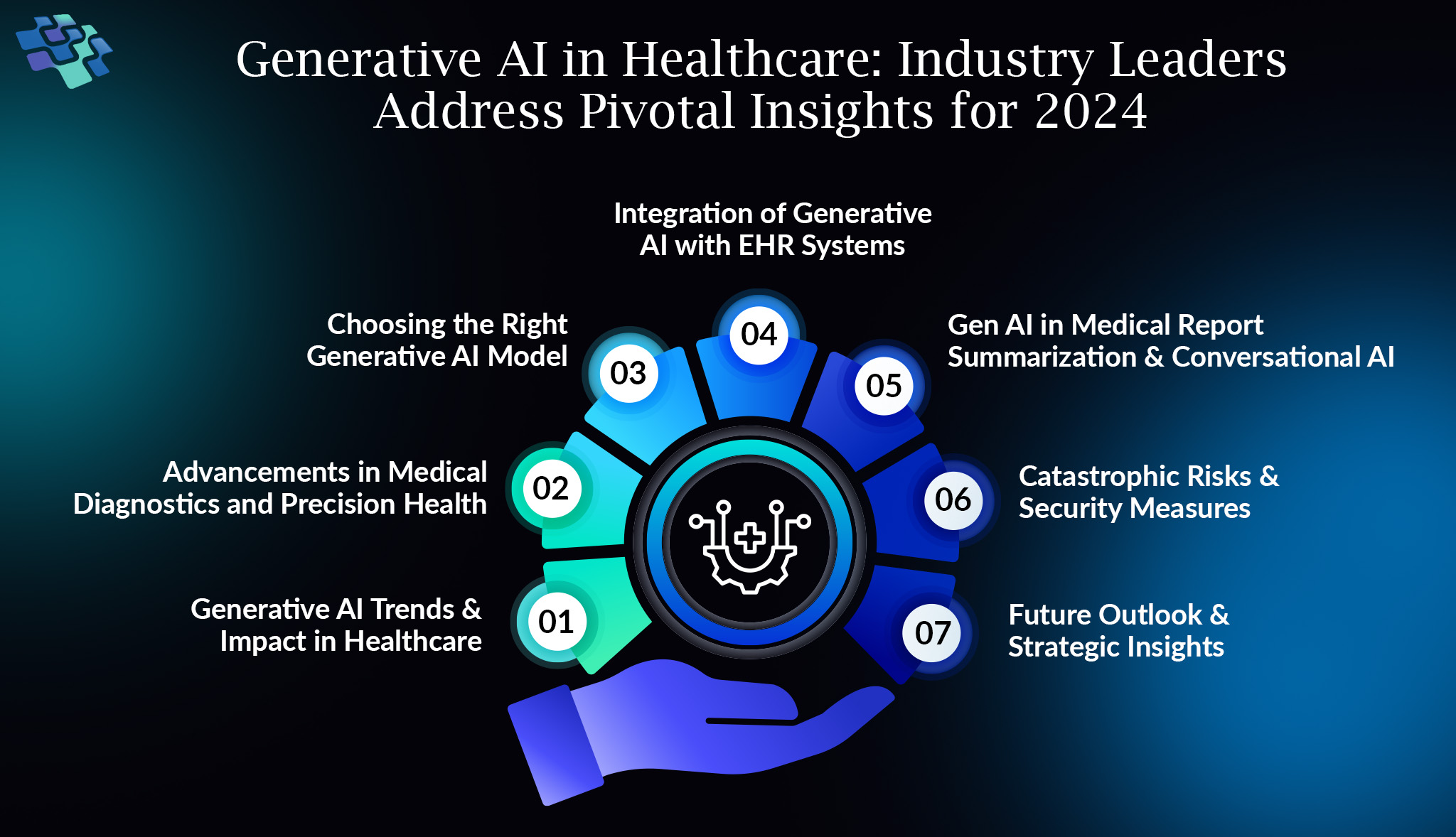
Generative AI in Healthcare: Reshaping Health Dynamics
Generative AI is poised to revolutionize healthcare by enabling unprecedented advancements in diagnostics, health treatment, and patient care. By analyzing vast amounts of data, Gen AI can identify patterns and provide insights that were previously unattainable.
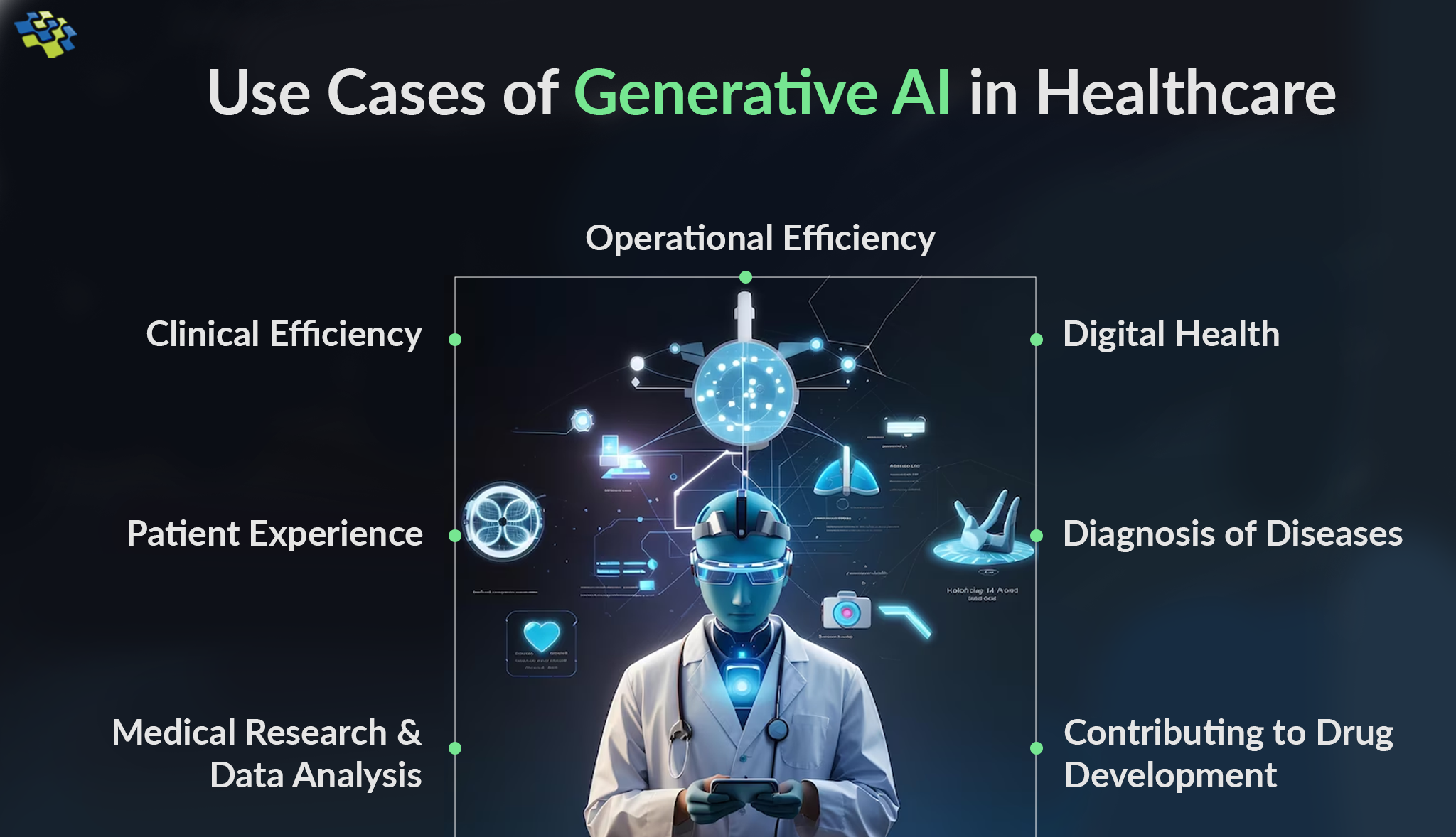
7 Most Crucial Use Cases of Generative AI in Healthcare
From personalized treatment strategies to drug discovery and medical imaging enhancement, Generative AI development services optimize decision-making and accelerate research. Its adaptive algorithms generate synthetic data...
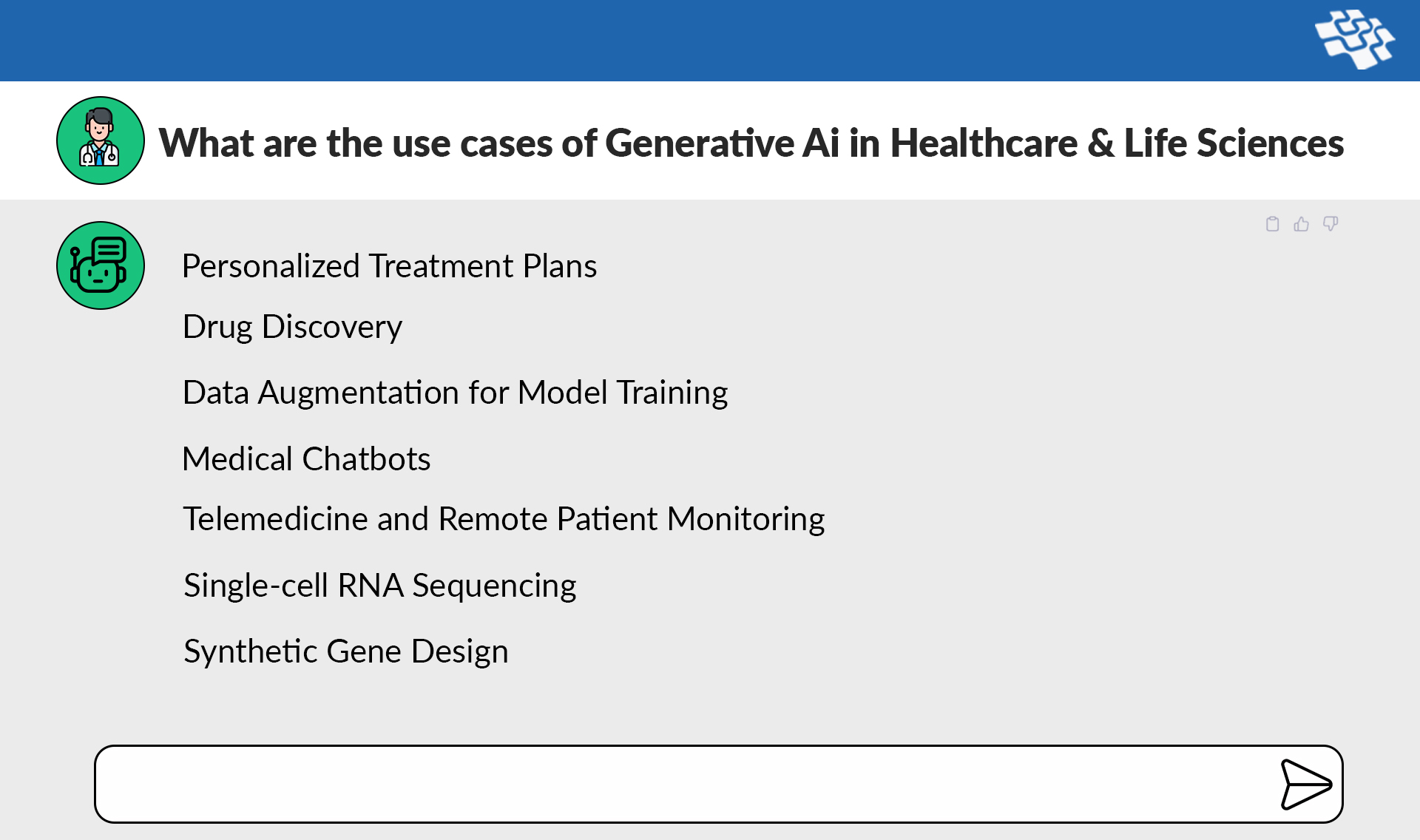
Adoption of Generative AI in Healthcare & Life Sciences
Generative AI in healthcare and life sciences is rapidly transforming the landscape, offering immense potential to revolutionize the industry. It’s ability to analyze large-scale medical data and create new content elevates the standard of care...
Stay In the Know
Get Latest updates and industry insights every month.
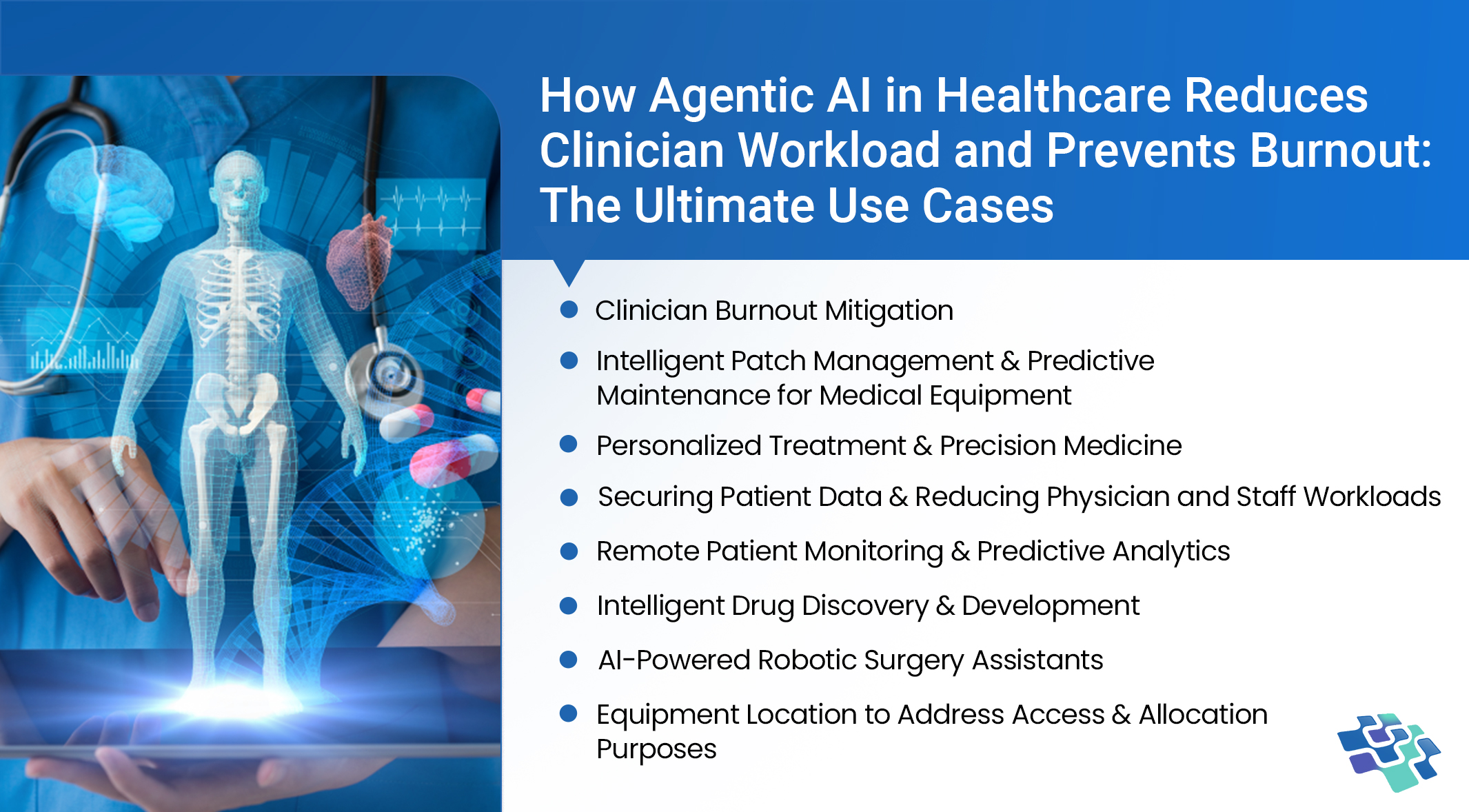 1. Clinician Burnout Mitigation
1. Clinician Burnout Mitigation